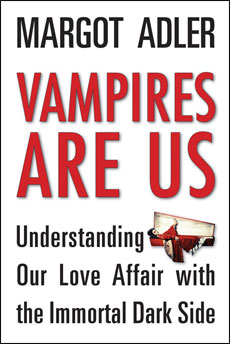Margot Adler has been involved with Earth-based spirituality, Wicca, and Paganism since 1972. She is a 35-year veteran correspondent, and you may visit her at www.margotadler.com.
In the preface to this enlightening paperback, Adler reveals that her quest to understand our culture's obsession with vampires began when her husband was dying of cancer. Part of him wanted to live forever, to cheat death, and to experience so much more. When the author was suffering with cancer, she tapped into the same feelings. She writes:
"Vampires let us play with death and mortality. They let us ponder what it would mean to live a truly long life. How would that change one's view of everything in society? Playing with the idea of a long life allows us to ask questions we usually bury, except in science fiction. What does one value more and what does one value less with a long human life? Would we become bored? Would we become more or less compassionate? Does the vampire's long life allow a different vision of the world? Would having a long life allow us to see the world differently, imagine social structures differently, and have a longer view? Would it increase or decrease reverence for the planet?"
Here are some of the other major themes Adler finds in vampire literature and films: issues of power, sensuality, identity, the persecuted other, the struggle to be moral, spirituality, and the environment. Whereas others might only read around 20 vampire novels just to get a feel for the genre, the author reports on the 270 books she has read on the subject with an annotated bibliography.
Out of all of this reading, Adler makes a good case for the idea that many fictional vampires come across as beings we can relate to and not monsters. Perhaps at this time in history, vampires are us: our blood is oil and our prey is the planet. No wonder we are so caught up in these stories, especially those where vampires try to overcome their violent nature and live with love. They depict our hopes, desires, and secret dreams.
